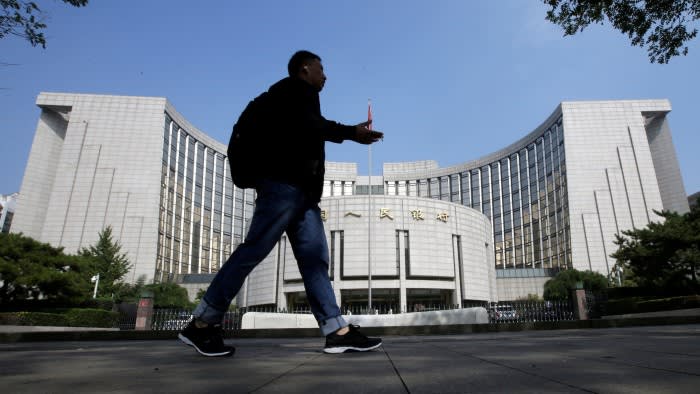Chinese markets have given a short-term welcome to an “unprecedented” toolbox promised by Beijing to stabilise capital markets and revive animal spirits, but the bigger concern is whether the measures will be enough to stimulate the faltering real economy.
The People’s Bank of China on Tuesday unveiled an Rmb800bn ($114bn) war chest to boost the stock market by lending to asset managers, insurers and brokers to buy equities, and to listed companies to buy back their stock.
This was the first time the PBoC had “innovated” and used these types of monetary policy tools to support capital markets, central bank governor Pan Gongsheng said at a briefing flanked by financial regulators.
The funds allocated could be doubled or tripled if the schemes work. Policymakers also floated an idea for a “stock stabilisation fund”, though few details were given.
The measures amount to one of the biggest bazookas the PBoC has aimed at China’s equity markets, which have slumped in the past four years, reflecting a lack of confidence in the country’s ailing economy.
Following the announcement, China’s CSI 300 index of Shanghai- and Shenzhen-listed shares — which is down more than 40 per cent since 2021 — rose 4.3 per cent for its best day since July 2020.
On Wednesday it added 2.1 per cent in a broad-based rally, while the renminbi strengthened by 0.5 per cent against the dollar to just over 7.01, its highest level in more than a year.
The loan programmes to support shares were among a swath of PBoC stimulus measures, including cuts to the benchmark interest rate, mortgage rates and downpayment requirements. They follow the US Federal Reserve’s bumper 50 basis point cut last week that gave the central bank room for manoeuvre.
“These measures have beaten market expectations,” said Ding Shuang, chief economist for greater China and north Asia at Standard Chartered. “It perhaps marks the beginning of more aggressive policy measures compared to in the past when people complained of incremental policy responses.”
Still, “we still need to look at the size and the take-up of [the programmes] to assess its impact on the market”, Ding said.
Jason Lui, head of Asia-Pacific equities and derivatives strategy at BNP Paribas, said: “There have been a few novel ideas, especially when it comes to the lending and swap facility.”
The new swap tool allows non-bank financial companies to borrow from the PBoC to buy equities, offering bonds, stocks or exchange traded funds as collateral. The relending programme offers cheap loans to commercial banks, which can then lend them to companies wanting to fund share buybacks as a way of boosting equity values.
Economists suggested the incentives to buy equities were targeted at broadening stock ownership from the so-called national team of state-backed financial institutions that earlier this year purchased billions of dollars’ worth of mainland-listed shares in an attempt to boost the market.
Wu Qing, chair of the markets supervisor, the China Securities Regulatory Commission, told the briefing on Tuesday that institutional investors by the end of August had increased their share of the free float in mainland-listed A-shares from 17 per cent to 22.2 per cent, compared with 2019.
But he said there were still “insufficient” mid- to long-term funds in the market, where rapid movements of retail money have often affected stock sentiment.
“The spirit of this programme is aimed at other financial institutions currently hesitant to increase their equity allocations”, said BNP’s Lui.
“It depends whether funds will be willing to borrow from the PBoC to buy stocks but be responsible for losses if they go down,” added Ding.
Beijing sees the stock market as a clear signal of a healthy economy and an important tool to manage social stability.
Analysts at Morgan Stanley said the stimulus was equivalent to 3 per cent of the entire free float of the China A-shares market, calling the measures “an absolute positive move”. They nevertheless warned that the new tools would not be a sufficient condition in China’s overall recovery.
“The long-term sustainability of market sentiment improvement and rebound rally are more dependent on macro recovery as well as corporate earnings growth bottoming out,” they said.
Economists noted that the stimulus measures on Tuesday were significant, especially the simultaneous cuts to the benchmark interest rate and the reserve requirement ratio, the amount of reserves lenders must hold. Pan said the 0.5 percentage point cut to the ratio alone would add Rmb1tn in liquidity.
But most analysts said only a large fiscal stimulus that stabilised a prolonged property slump in China and directly benefited households would help reignite confidence and stymie deflation.
The PBoC announced measures that would in effect reduce interest rates on a Rmb300bn scheme to buy up unsold housing, but the programme has struggled to get off the ground.
Robert Gilhooly, senior emerging markets economist at Abrdn, said the interest rate cut for existing mortgage holders on Tuesday was the “closest thing we’ve had to a fiscal transfer for households”.
But ultimately, the government would have to step in with more state funds to bail out the property sector, or household spending would probably “remain constrained by the negative wealth effect from falling house prices and a weak labour market”, he said.
